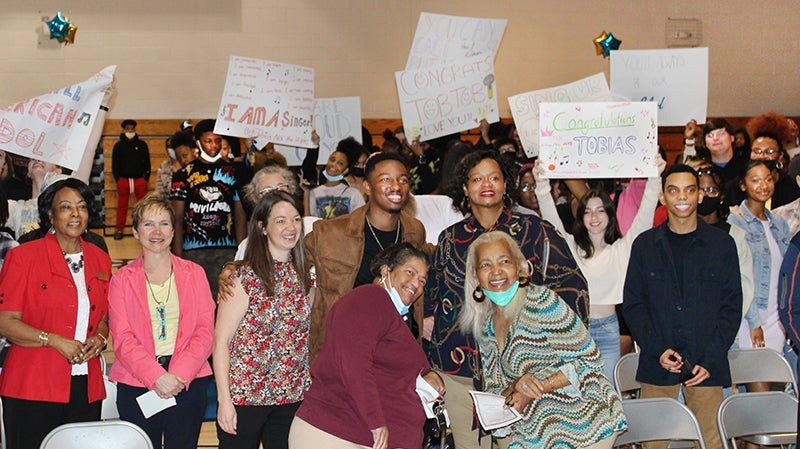Programs for Progress
Published 9:07 am Tuesday, November 18, 2014
AHOSKIE – Tim Baynes, Executive Director of the Mideast Commission, addressed the Ahoskie Town Council at its November meeting and said his group is working to “meet the needs of our citizens” and to be a resource to local governments.
“These programs are in response to our mission to promote and facilitate intergovernmental cooperation,” Baynes said. “We want to assist and to promote economic stability and development of the region as well as facilitating effective communication between all levels of government to issues critical to our region.”
Baynes says most of the Mideast Commission programs have remained consistent from year-to-year.
“Under our Aging program we used to have someone on staff years ago that was certified by the US Department of Housing and Urban Development (HUD) as a counselor, but we lost that position some time ago due to staff turnover,” Baynes stated. “But I’m happy to announce that we do have someone on our Aging staff now that is certified by HUD to conduct Reverse Mortgage Counseling because that is a very hot topic now among the elderly and senior citizens on how they can tap into the equity in their homes.”
Baynes did note that seniors who wish to take advantage of this program need to be as aware of the process as possible.
“This is also one of the most dangerous things that seniors can do if they are uneducated to the process,” he said.
Baynes said Beth Harrell is the certified counselor and that under a grant she is more able to go into the community and meet with citizens rather than having individuals come to Mideast headquarters in Washington, NC. Once a week, Baynes says, she will be in Ahoskie to meet with people at the Senior Center who want to get the counseling.
Another program Baynes highlighted in the MEC Aging department was certified Medicare Control Counselors to try and prevent fraud and educate seniors about their available Medicare benefits.
“We’re not necessarily working (exclusively) with local governments anymore,” Baynes emphasized. “We’re getting more out on the street and working with the citizens as much as local governments.”
Under administration Baynes says another service to local governments is ethics training through the UNC School of Government for local elected officials; another small-cost item that can provide big benefits to the local governments.
“This year for the municipalities we’re working with about ten of our municipalities and have trained about 65 individuals, and this is a worthwhile resource to our local governments,” Baynes said.
Under Local Government and Economic Development the Mideast Commission has upgraded its Small Business Loan Program and is trying to promote that heavily throughout the five-county region.
“We have a lot more flexibility to meet the needs of small businesses if they cannot get funding from conventional sources,” he said. “We have limited funds in that program, but we are heavily marketing that so individuals and businesses can receive financing if they want to grow their business.”
Under Grant Research and Application Assistance one of the things the MEC has done is offering local government a chance to have an online grant research tool.
“It gives local governments a chance to have access to this on a 24/7 basis and you won’t have to rely on us,” Baynes reported. “We serve 45 local governments, so it’s hard for us to know what each and every individual need among the entire 45 would be.”
The Mideast Development Corporation – the non-profit arm of the MEC – is available because according to the Executive Director, some grantors will not fund local governments, but they will fund non-profits.
“We try to have both avenues available as we seek to try to find grant resources for our communities,” he said.
The non-profit currently owns three multi-unit housing units in Ahoskie and Farmville designed for the seniors and the stable population.
The MEC Planning Department has been growing in the last year, especially in the transportation department, ordinance updates, and even recreational planning.
Workforce Development – one of the Commission’s primary programs – begins working with individuals as early as age-16.
“There’s no age limit on that program,” Baynes said. “We also have the NCWorks, formerly the JobLinks Career Centers program,” he stressed. “That includes one located on the campus of Roanoke-Chowan Community College. We not only work with local governments here, but also with individuals and businesses to meet the growing demands of our local government.”
Baynes said that 62 percent of the Commission’s funding came from the federal government last year with 24 percent from state sources, and 13 percent from local sources in the form of the dues that the local governments pay that the Commission can use as matching funds. The budget for 2013-14 was approximately $9.2 million.
“And for this year,” Baynes said. “We’re hovering somewhere around that same range; so you can see where our finances are coming from and where they’re going: under 50 percent into the Aging program and over 38 percent into Workforce Development – our two major programs.”
“We try to work with local governments, and we appreciate your support and participation,” he concluded. “Please call on us if we can assist you.”


